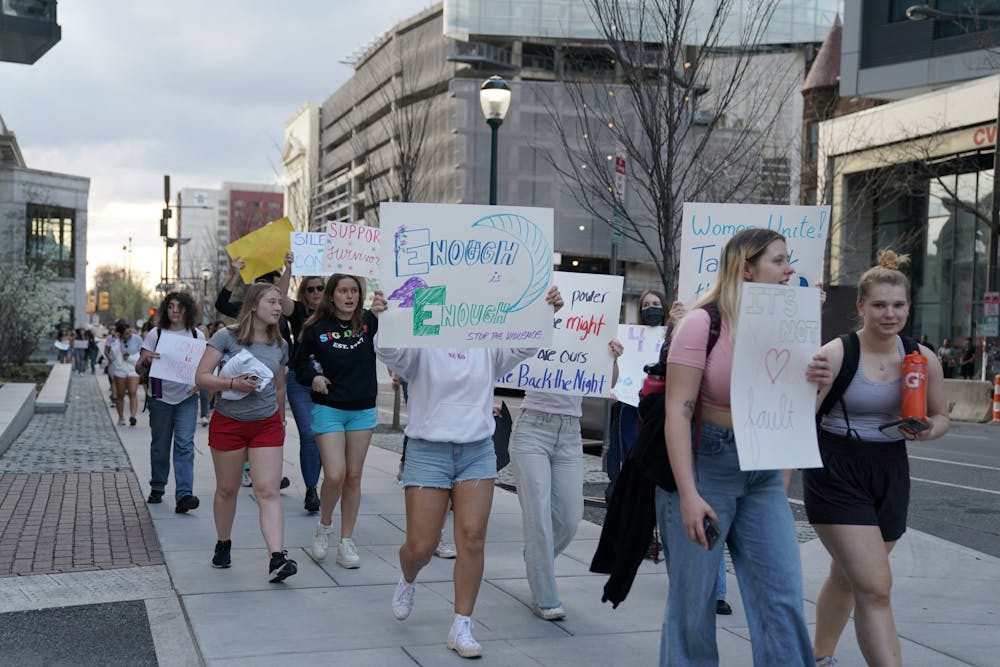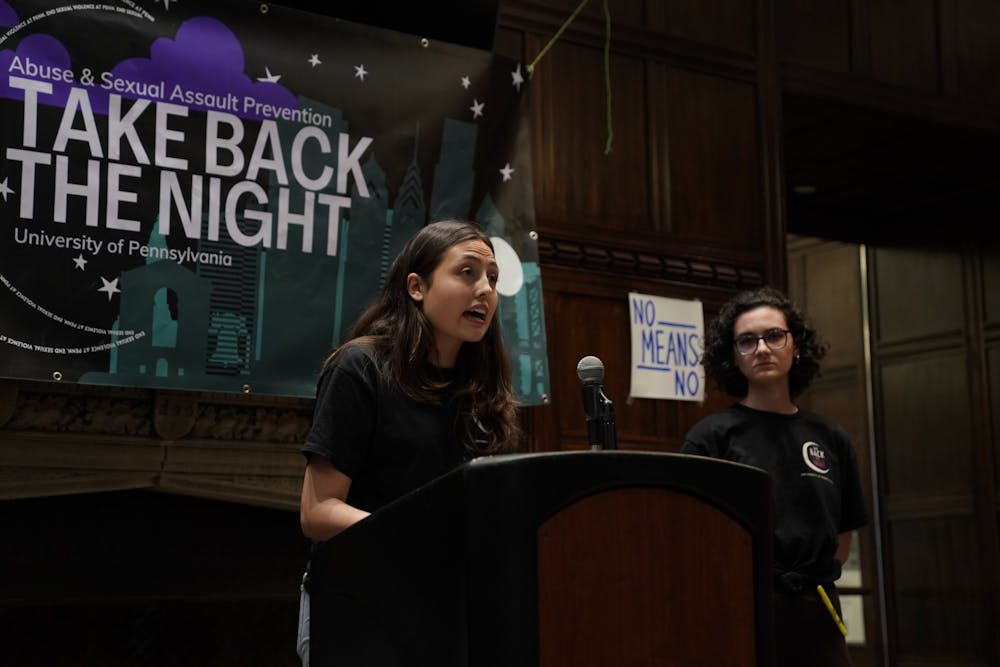On a cloudy Thursday night in late March, the cozy, domestic interior of the Penn Women’s Center has been transformed into a hub of action. Harley Haas (C '24), the chair of Abuse and Sexual Assault Prevention, balances her laptop on her knees as she simultaneously sends out emails and welcomes in another volunteer. Leslie Lytle (E ‘23) yells over the organized chaos, “Has anyone heard from Liz Magill?” Two volunteers sit on the couch sorting through bags of chalk while sharing the run–down of their day. In just one week, these months of planning by the campus–wide organization, ASAP, will leave the living room of Women's Center and culminate as the campus’ largest anti–violence rally—Take Back the Night.
The 2023 Take Back the Night Protest marks the 50th anniversary of the first major anti–violence protest on campus. In 1973, there was 200–woman sit–in for four days in response to gang rapes on campus, resulting in the creation of the Penn Women’s Center, Special Services, the Gender, Sexuality, and Women’s Studies Department, and various other safety measures on campus. Despite the victory of the 1973 protest, only ten years later another gang rape on campus received national coverage, as over 600 students protested for greater safety on campus. ASAP builds upon the legacy of anti–violence activism, working to increase visibility on the continued prominence of sexual assault on campus despite the work of their forebears. “I just think it's very interesting looking at these examples in the past and thinking about how now there are still rapes on campus, still rapes at frats,” Leslie says. “And yet, we have no 500–person protests about them.”
Despite the prevalence of assault at Penn, members of ASAP have noticed people often feel uncomfortable when discussing anti–violence activism. “There's different types of activism that people are more ready to promote, for example, like reading to kids in West Philadelphia. People are a lot more likely to promote that because there are very happy connotations around it,” Harley notes, “Whereas if you're going to be talking about how people here have had life–changing events that will forever stick with them and the real consequences for that, people turn their ears off a lot faster because they're like, ‘This is too negative for me to hear.’"
ASAP hopes to recenter campus conversation on sexual assault and safety through its annual Take Back the Night rally, forcing both Penn students and staff to reckon with the realities of violence on campus. By increasing the visibility of this crisis, ASAP hopes to create a space on campus where students can report instances of violence and band together in order to create a safer community. Leslie, a graduating senior, reflects that their work with ASAP will continue to be important to them after graduation. "I think Sexual Assault Awareness and Prevention applies to every single field,” she says, “It will apply to you in a professional workplace.” Empowering students to talk about sexual assault and violence early on gives them the skills to address the issues they may face in the workplace.
Organizing an event of such magnitude required a lot of passion—and a lot of time. “We've been working on this since August. We have two board member positions in ASAP solely dedicated to putting this event on, and then in the spring semester, we meet at least once a week for an hour every week in order to go through the whole list of stuff that we have to do,” says Harley, “It is a very intense process.”

The 2023 Take Back the Night event marks the return of ASAP’s annual event after a two–year break due to the pandemic, and the 2022 TBNT got rained out. “For a lot of folks, it's their first Take Back the Night because of the pandemic,” says Harley. Beyond reintroducing the student body to ASAP’s work, the impact of the COVID–19 years posed unique challenges for ASAP. The group is working to rebuild their numbers and visibility after years of virtual work. Much of the leadership is new to ASAP due to the graduation of veteran leaders. Leslie notes that this year was their first year as part of the organization due to COVID–19, but they were excited to jump into the thick of it as a coordinator for TBTN after learning about the organization when they were back on campus last year. “We actually had no ASAP members last year that had ever been to an in–person ‘Take Back the Night,’ so we were on ground zero,” says Harley. “This year we have a foundation. We know things that we want to do better from last year. So we’re like: ‘Let's do better.’"
The hard work paid off. On April 6, Take Back the Night gathered hundreds of students to discuss sexual assault prevention. Though there was the risk of storms again this year, forcing a relocation to ARCH. Ultimately, the weather worked in ASAP’s favor, allowing for the full rally and march to take place. The late–nights in the Penn Women’s Center, frantic emails to co–organizers, and the stress of bureaucratic logistics culminated in a powerful event. Gathered in the ARCH living room, survivors, administrators, and student organizations shared their stories and hopes for a better future, creating a space to candidly address the realities of sexual abuse. Looking back with pride on her effort to transform the plan to protest, Harley reflects, “I hope next year's event is even bigger, and we have already begun the planning."

